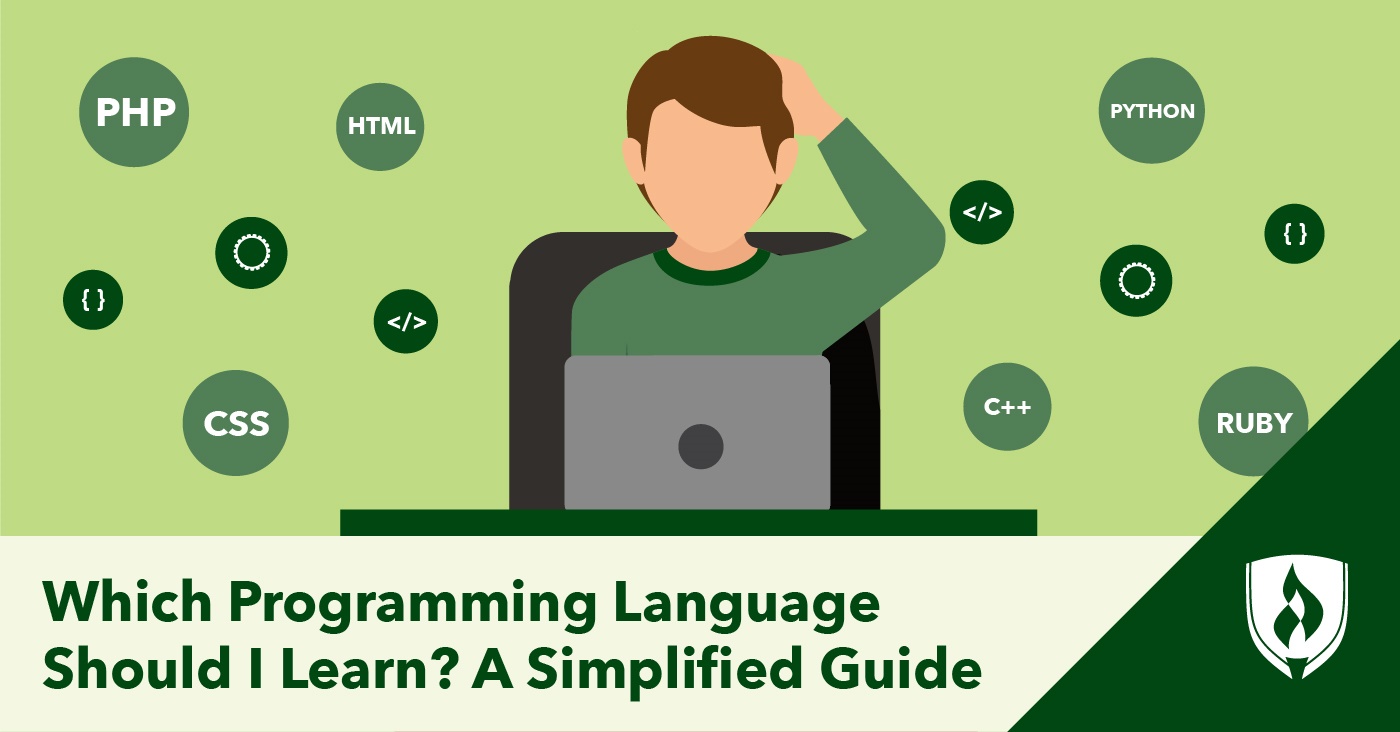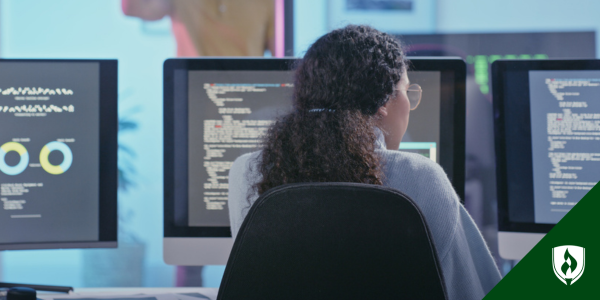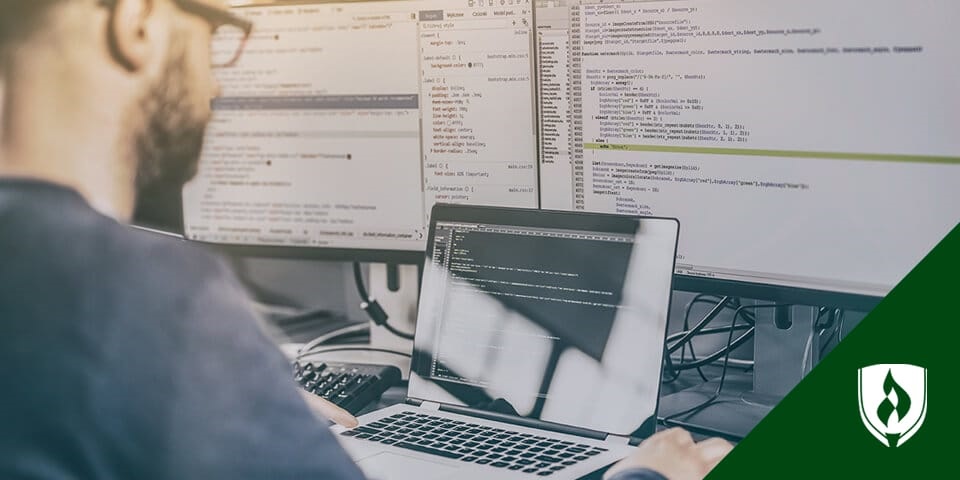Which Programming Language Should I Learn? Decoding the Basics
By Brianna Flavin on 05/17/2021

Designing beautiful websites, developing innovative apps, creating the latest software—you envision big things for yourself. And that’s great—technology is booming, and skilled programmers, developers and designers are needed across the board.
There’s the catch, though: skilled. You may be asking yourself what it takes to gain the knowledge and experience needed to climb the ranks of the tech world. One of the biggest questions you may have is: Which programming language should I learn?
While the categorization of programming languages is somewhat complex, there are currently over 100 programming languages out there! But you don’t need familiarity with all of them to be effective in your career. When boiled down, they’re really just different ways of providing instructions that can have a lot of fundamental overlap.
“Programming languages are becoming less about the complexities of the language and more about dealing with abstractions that simplify underlying complexities,” says Usman Arshad, Nazr Technology chief technical officer (CTO) and senior distributed systems engineer. As the landscape of programming languages changes, choosing one to learn is hugely dependent on what you are hoping to do with it.
So whether you would like to be a web designer, a back-end developer, a smart home programmer, an app creator, or you just want to learn the most versatile programming languages, we have your answer.
The next time you are wondering, “Which programming language should I learn?” refer to this article for some expert advice.
The best programming languages for beginners
Not everyone has a clear idea of what they want to do; they only know what their passions and interests are. Sometimes, school can help mold and formulate interests in specific niches, but for now, you want to learn the basics of programming so that when you do decide what you’d like to do, you have a solid foundation.
For that, experts recommend a few languages to get your feet wet.
1. Java®
“Java is good for front-end and back-end [development], and it is a gateway into JavaScript,” says Tom Meeus, CTO of Crisalis LLC. “Java will also give them a head start into C#, which is the language supported by Microsoft and integrates easily with lots of database back-ends.”
Java is consistently rated one of the most popular programming languages, so it seems a natural fit for any beginner looking to build a solid foundation of programming skills.
2. Python®
Python is another popular language that is used on some of the most widely used websites on the internet. It features a relatively simple vocabulary, is highly versatile and doesn’t depend on users to be well versed in other languages to be effective.
“It has a large community with lots of resources for using it, and since it is open source, programmers can be part of the continual development of the language,” says Meeus.
Python has a plethora of uses, including use in popular fields, such as web and software development.
Notable mentions: Ruby, PHP
The best programming languages if you want to become a web designer
The first thing to understand when considering web-based languages is that web design and web development are very different. Web development is usually referred to as back-end development and is responsible for the actual functioning of the site. Web design is front-end and responsible for the aesthetics and visual design of the site. With that, here are the top languages for web design.
1. JavaScript®
Not to be confused with Java, JavaScript is an essential for any future web designer.
“I'm a web developer doing mostly front-end (user interfaces), and there is no doubt that JavaScript is the most important language in this area,” says Cindy Potvin, developer at RobotsBench. “Since JavaScript is so important for the web and has such a large user base, it keeps growing in other areas of software development.”
JavaScript is the language that allows you to control what items on a page do. There are many frameworks for JavaScript too, which streamline the coding process. AngularJS, React and Ember.js are popular frameworks to consider.
2. HTML & CSS
While HTML and CSS are not exactly programming languages, both are responsible for much of the visual design on a page. HTML, or hypertext markup language, is responsible for the aesthetic appeal of a website, including its font, type and background. HTML cannot stand on its own but is often found with other languages, such as JavaScript.
CSS, or cascading style sheets, is used for the layout and design of a webpage. It is also used for the adaptability of a site to be used on different devices and screen sizes. It can be used independently of HTML; however, they are usually used together and are essentials for any prospective web designer to learn.
Notable mentions: Python, jQuery®
The best programming languages if you want to be a back-end developer
“Backend developers have slightly different requirements and aren’t restricted by what web browsers support,” says Cody Reichert, owner of Assertible. Therefore, the back-end language that you choose depends entirely on personal preference and goals. Some back-end languages are more common than others, so we parsed through the data and found two programming favorites.
1. Ruby
Ruby has been surging in popularity for a while. With its framework, known as Rails, Ruby on Rails is a powerhouse language for popular sites such as Hulu® and Airbnb®. It was designed to be a clean, easy-to use language. “[It] can be used to build a backend API, server or system,” Reichert says.
2. PHP
PHP stands for hypertext preprocessor, and it is one of the most widely used languages for back-end web development. While it has a variety of uses, it serves as the foundation for many websites, such as Yahoo® and Wikipedia®. It can be easily embedded into HTML to change the output of a webpage.
“Those looking to learn back-end development will find PHP is a fairly easy language to learn and can find examples of it all over the internet,” says Logan Seeley, an associate software consultant.
Notable mentions: Python, Java
The best programming languages if you want to make apps
Programming languages for apps are slightly different in that you will need to know the platform on which you are creating—iOS® and Android® each have their own defined languages. We found the fastest-growing language for each platform to help you.
1. Swift
Swift was developed by Apple® in 2014 and has since climbed its way up to become the 13th most popular programming language. Swift is similar to the Objective-C language but was built to withstand more errors than Objective-C. If you are hoping to create apps on any Apple product, then Swift is the language for you.
2. Kotlin
Another newer language that has shot up in popularity, Kotlin is the third programming language compatible with Android (next to Java and C++). Kotlin can be used with or without Java, so it is not essential to know Java before learning Kotlin. If you are interested in any kind of Android app creation, desktop development or server-side development, Kotlin is a worthwhile language to learn.
Notable mentions: Java (for Android), Objective-C (iOS)
The best programming languages for software application development
If you want to build software, programming languages are definitely a big deal. While there’s a lot of options to choose from under this category, we’ve identified two that can provide a solid foundation to build on.
1. Java
“Our company believes that Java is the most important and relevant programming language nowadays because of its benefits,” says Max Savonin, CEO at KeenEthics. “It's relatively simple, and it does not depend on any platform.” Savonin says Java is also secure and object focused, allowing developers to reuse code and apply standardization.
2. C++
Based on the C language, C++ supports object-oriented programming, and having an understanding of object-oriented concepts is highly sought after in the software world. C++ is an extremely popular language that is used in nearly every kind of software.
“While C++ may be a bit harder [to learn] than languages such as Python, it equips programmers with the skills and knowledge to tackle just about any software-related challenge,” says Seeley.
Notable mentions: Python, C
The best programming language for cybersecurity
For this one, we only have one primary nomination. The interesting thing about cybersecurity is that experts need to use whatever programming language is most in use by other systems—whatever language someone is most likely to attack or exploit—and that’s PHP.
1. PHP
“PHP is the most valuable programming language for students who want a career doing software development in the cybersecurity field,” says Mark Soto, cybersecurity developer for Cybericus. “It's an older language that is quite popular and used to power the back-end of millions of web applications. Since it's so commonly used, this makes it a target for hackers.”
Soto points out that knowledge of PHP will help developers as they secure web applications by locating and removing vulnerabilities in PHP code, making PHP useful for developers apart from cybersecurity as well.
Notable mentions: SQL, Python
The best programming language for machine learning and data
Everyone seems to want data-driven everything these days. With so many systems established for machine learning and big data, that desire can certainly become reality. What programming language is most important in building or maintaining massive systems like these?
1. Python
“Python is the most important programming language in my toolset,” Arshad says. “Python's ecosystem is incredibly large, and over the last three years, that ecosystem has grown significantly to better support machine learning and big data requirements.”
Arshad points out that Python’s relative simplicity has made it easy for researchers, data scientists and data engineers to adopt—helping it grow towards big data-related usage. “Python is a succinct language that allows its users to focus on business logic as opposed to the complexities of the programming language itself,” Arshad says.
The future of programming languages
The world of programming is ever-changing, so it’s important to note which areas you’re interested in and adopt those languages and systems. While there’s really no wrong way to start learning programming skills, it should help to have a sense of direction on which to language to prioritize.
Figuring out which programming languages you should learn is only part of the equation though—many employers will also look for a degree in Computer Science or another tech-related field to round out a resume. If you’re considering taking that step, it’s good to know what career opportunities are out there.
To help with this, we’ve rounded up “9 Programming Careers for Coding Connoisseurs” to show you some of the exciting prospects for those who have a tech degree.
Airbnb is a registered trademark of Airbnb, Inc.
Android is a registered trademark of Google LLC.
Apple is a registered trademark of Apple, Inc.
Hulu is a registered trademark of Hulu LLC.
iOS is a registered trademark of Cisco Systems, Inc.
Java and JavaScript are registered trademarks of Oracle Corporation.
jQuery is a registered trademark of Software Freedom Conservancy, Inc.
Kotlin is a registered trademark of the Kotlin Foundation, Inc.
Python is a registered trademark of the Python Software Foundation.
Wikipedia is a registered trademark of Wikimedia, Inc.
Yahoo is a registered trademark of Oath, Inc.




